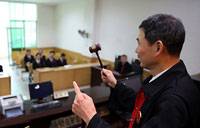BEIJING - China's top legislature voted Saturday on name principles to preserve the convention and prevent those parents who want to do something off-beat or unorthodox in naming their babies.
 |
| China passes Counterespionage Law |
 |
| China ratifies national Constitution Day? |
It says citizens must use parents' surnames in principle, but can choose other surnames such as those of lineal relatives, those of foster-parents or other surnames for "rational reasons." People from ethnic minorities can name themselves based on their own custom.
The interpretation was based on two articles in the general principles of the Civil Law and the Marriage Law, which stipulate that all Chinese citizens have the right to name; a surname can be that of either parent.
However, there are many cases of people who do not follow the convention, resulting in disputes and refusal by police to register newborns.
Names should "respect social morality" and should not damage public interests, according to the interpretation.
Chinese names usually consist of three, or sometimes two syllables, each having its own character. The family name, or surname -- which is usually a monosyllable -- precedes the given name. There are no middle names, and there is a lot of flexibility over the given name, but it rarely exceeds two characters.
"Surnames reflect blood heritage, ethic order and cultural tradition. Choosing surnames concerns social conventions," the interpretation says.
Surnames are an important component of Chinese culture and have been important for more than 5,000 years, said Xin Chunying, deputy head of the Legislative Affairs Commission of the NPC Standing Committee.
The following of parental surnames is one of China's cultural symbols and part of China's social structure, she said, adding it is also in line with the majority's wishes and practice.
"Family is still the cell of society," said Prof. Yang Dawen of Renmin University of China, adding that following parents' surnames enhances familial cohesion.
But considering practical situations, citizens can choose other surnames for "rational reasons," says the interpretation.
In some cases, people want to choose surnames other than those of the parents. One grandfather changed his surname in the early days of the revolution, and the family now wants the grandchild to use the original surname. Parents sometimes attempt to foist a benefactor's surname onto a child, or use a grandmother's surname to extend the matriarch's bloodline.
Lawmaker Jiang Qiutao wants strict rules on surnames to prevent problems in social management. For example, some people try to evade debt or criminal penalties by changing their names, which causes difficulties for police and the courts.
But fashion conscious young people are more open to new names. A survey by Tong Jianjun, associate professor at Sun Yat-sen University, showed 66 percent of his 267 students planning not to follow convention.
To avoid duplication of names, more parents are choosing fancy or exotic names for their children, some having more than three characters or even having an English letter in it such as "Zhao C." These names are generally refused by police bureaus.
"Names that are too strange will bring inconvenience," said Prof. Ma Yinan of Peking University.
